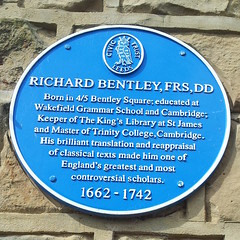Richard Bentley FRS
Commemorated on 1 plaque
Richard Bentley FRS DD born in 4/5 Bentley Square; educated at Wakefield Grammar School and Cambridge; Keeper of The King's Library at St James and Master of Trinity College, Cambridge. His brilliant translation and reappraisal of classical texts made him one of England's greatest and most controversial scholars. 1662-1742
Bentley Square, Calverley Rd, Oulton, LS26, Leeds, United Kingdom where they was


